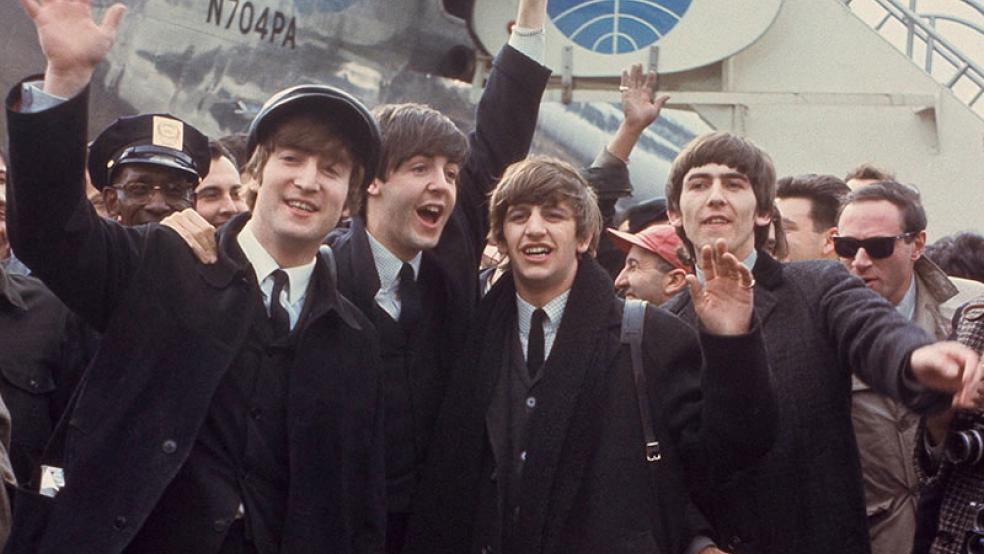The Beatles’ arrival on the shores of America 50 years ago is almost impossible to underestimate – it changed practically everything.
The group altered our music, our culture, our lifestyles – and the way we viewed authority. The four talented mop-tops from Liverpool were a sociological phenom. “Pop musicians of their generation can rule the world,” Graham Nash said in the ‘60s as a member of the Hollies; while Dick Cavett, who interviewed both John Lennon and George Harrison, says today, “It’s hard to imagine our world without the four.”
Here are seven significant ways the Beatles changed America:
1. We Became a Guitar Nation. When the Beatles played to more than 73 million viewers on “The Ed Sullivan Show” on February 9, 1964, America swooned for the charming Brits who delivered an irresistible blend of British skiffle and American pop, rock, and R & B, serving it up with a wink and a shake of their shaggy hair.
The British Invasion – from the tepid Dave Clark Five, to the edgy Animals, to the menacing (by comparison) Rolling Stones – soon followed. Suddenly, every kid in America picked up a guitar as bands sprung up in basements and garages.
“Before the Beatles, there were groups that played together,” says Bryan Cumming, a vocalist with the WannaBeatles, a tribute band. “But the Beatles made the experience so exciting that it changed the cultural perception of what a band is. The Beatles had an overwhelming influence on young people’s thinking – but they were so eclectic and energetic that a lot of older people embraced them, too.”
2. We Rediscovered Joy. The Beatles lifted the country out of a numbing grief over the Kennedy assassination, which happened just two-and-a-half months before the Fab Four arrived. “After JFK’s assassination in 1963, the Beatles were the only thing that made 1964 bearable,” remembers pop artist Tommy James (of “Mony Mony” and “Crimson and Clover” fame). “They also caused my generation to take a much deeper look at what was happening in the world,” says James, one of many, along with Dick Cavett, who’s taking part in a charity event this weekend called “NYC Fab 50: Celebrating the Music of the Beatles.”
3. We Changed Our Hair. The crew cut ruled before the Beatles, or men wore their hair combed back. “At most of their early U.S. press conferences, more questions pertained to their hair than their music,” says Richard Courtney, co-author of Come Together: The Business Wisdom of the Beatles. The Beatles’ do was much longer, combed down over the forehead but barely touching their ears.
As the Beatles grew their hair longer, society followed. “Only with Michael Douglas’s Gordon Gecko and the L.A. Lakers’ coach Pat Riley did society return to the Brylcreem look,” says Courtney. The Beatles also ushered in fashion changes with their collarless, Pierre Cardin designed suits – overseen by manager Brian Epstein. Penny loafers and boat deck shoes gave way to Cuban-heeled Beatle boots, and by 1966 Carnaby Street’s “mod” look ruled as the fashion world began marketing to teens as never before.
4. We Felt Anglo Envy. England’s image changed from old and stodgy to the hippest on the planet, with London now a cultural mecca. “Before the Beatles, England looked to America for a lot of its music,” recalls Ken Douglas, who became a sought-after disc jockey in the ‘60s largely on the strength of his British accent. “Then with the Beatles, everything British was all the rage.” That love affair continues. “Downton Abbey,” anyone?
Related: Why Downton Abbey's Servants Had It Better Than Today's Minimum-Wage Workers
5. We Enjoyed a Musical Renaissance. Popular music was transformed as the Beatles turned from simple songs of romantic pursuit (“I Want to Hold Your Hand”) to complex, experimental, long-form songs and concept albums (“Sgt. Pepper’s Lonely Hearts Club Band”). “Every artist during the ‘60s was chasing the Beatles in one way or another–their sound, their songs, and lyrics,” says Tommy James.
Before the Beatles, recording artists rarely wrote their own material, but the Fab Four inspired many. “John Lennon and Paul McCartney taught Keith Richards and Mick Jagger how to write songs,” says Courtney. New instruments appeared on pop records, too, as George Harrison’s sitar awakened America to Indian music. “I’m Cuban born,” adds the WannaBeatles’ drummer, David Toledo, “and when I listen to the Beatles, I hear the Latin influences. ‘I Feel Fine’ has a Caribbean groove, and there are so many songs – ‘And I Love Her,’ ‘Til There Was You – where they used congas and Latin percussion.”
6. We Experienced a Social Uprising. As their clothing and hairstyles became more extreme – the Beatles were sporting facial hair as early as 1966 – many bohemian behaviors and anti-establishment habits matched those of the counterculture, including smoking dope and hallucinogenics. The group's songwriting, too, reflected this, as it became psychedelic at times.
7. Our Creativity Blossomed. The Beatles’ music synchronized an explosion of creativity and awareness, from pop art to spiritualism. When they sang “there’s nothing you can do that can’t be done” in “All You Need is Love,” we believed it – and chased that. “The ‘60s saw a revolution … in a whole way of thinking,” John Lennon once remarked. “The Beatles were part of the revolution, which is really an evolution, and is continuing. We were all on this ship – a ship going to discover the New World. And the Beatles were in the crow’s nest.”
Top Reads from The Fiscal Times:
- ‘Netflix Bitch’: The New King of Content Is Getting Cocky
- Even Beyond and Justin Timberlake Can’t Save the Music Biz
- Sacre Bleu! Burgers Beating Baguettes in France



